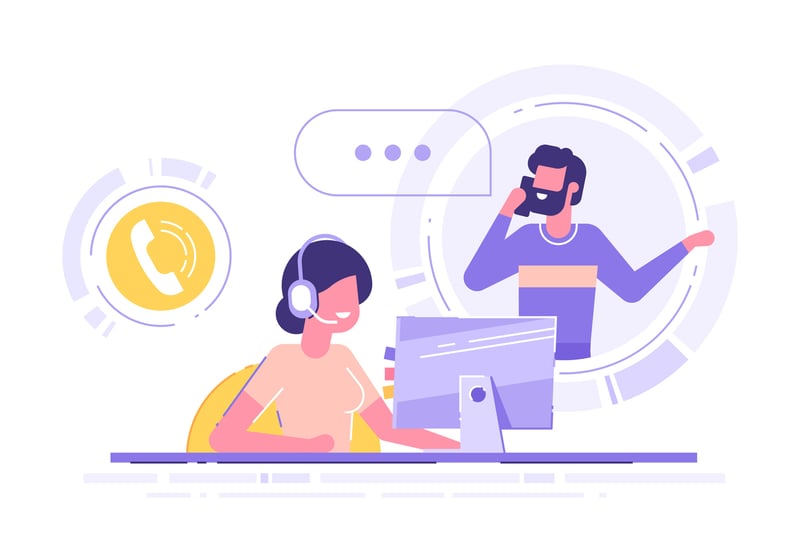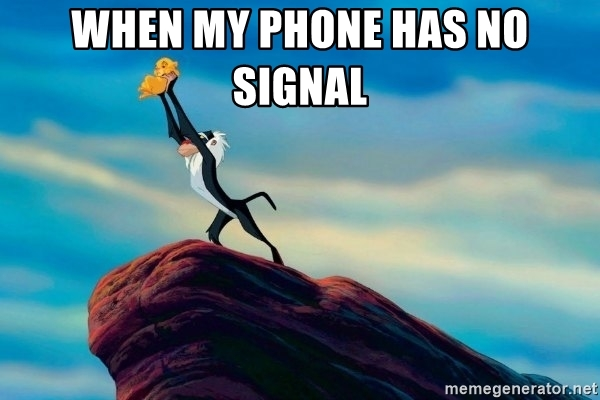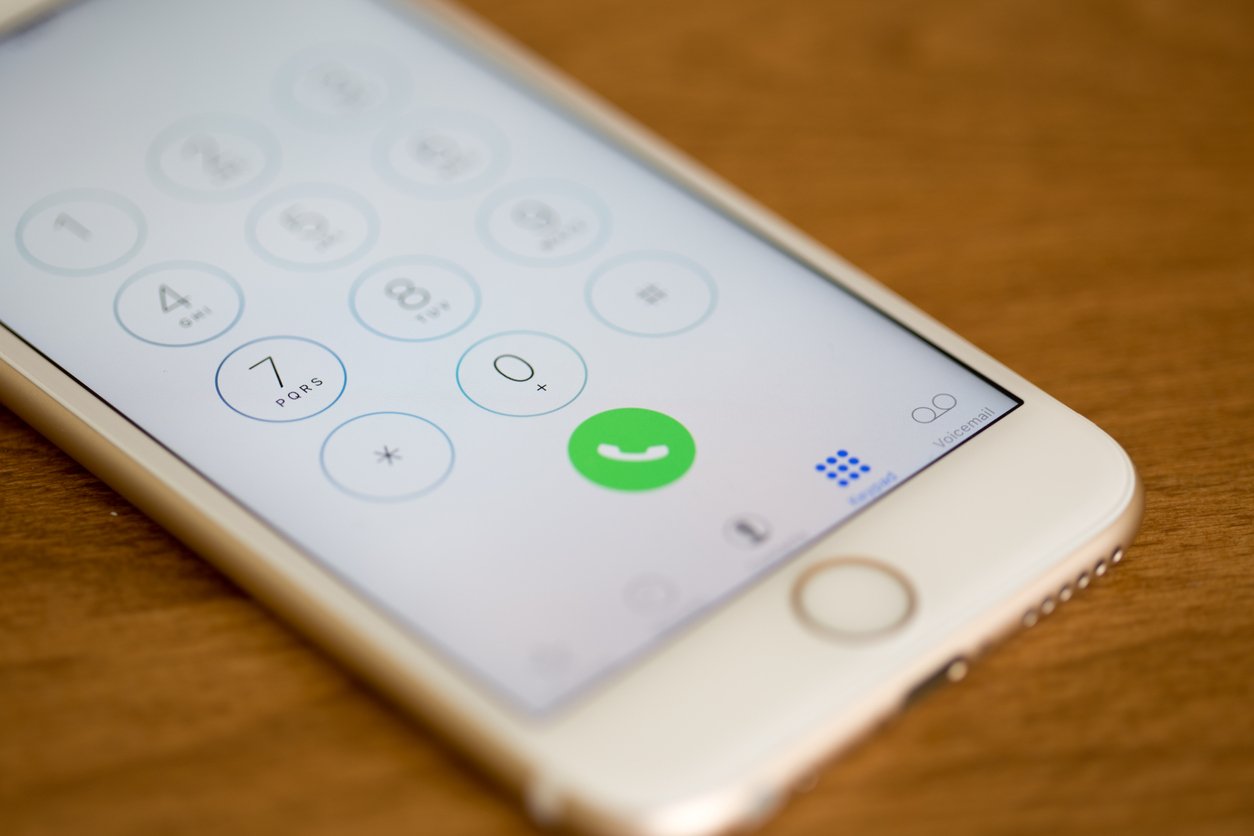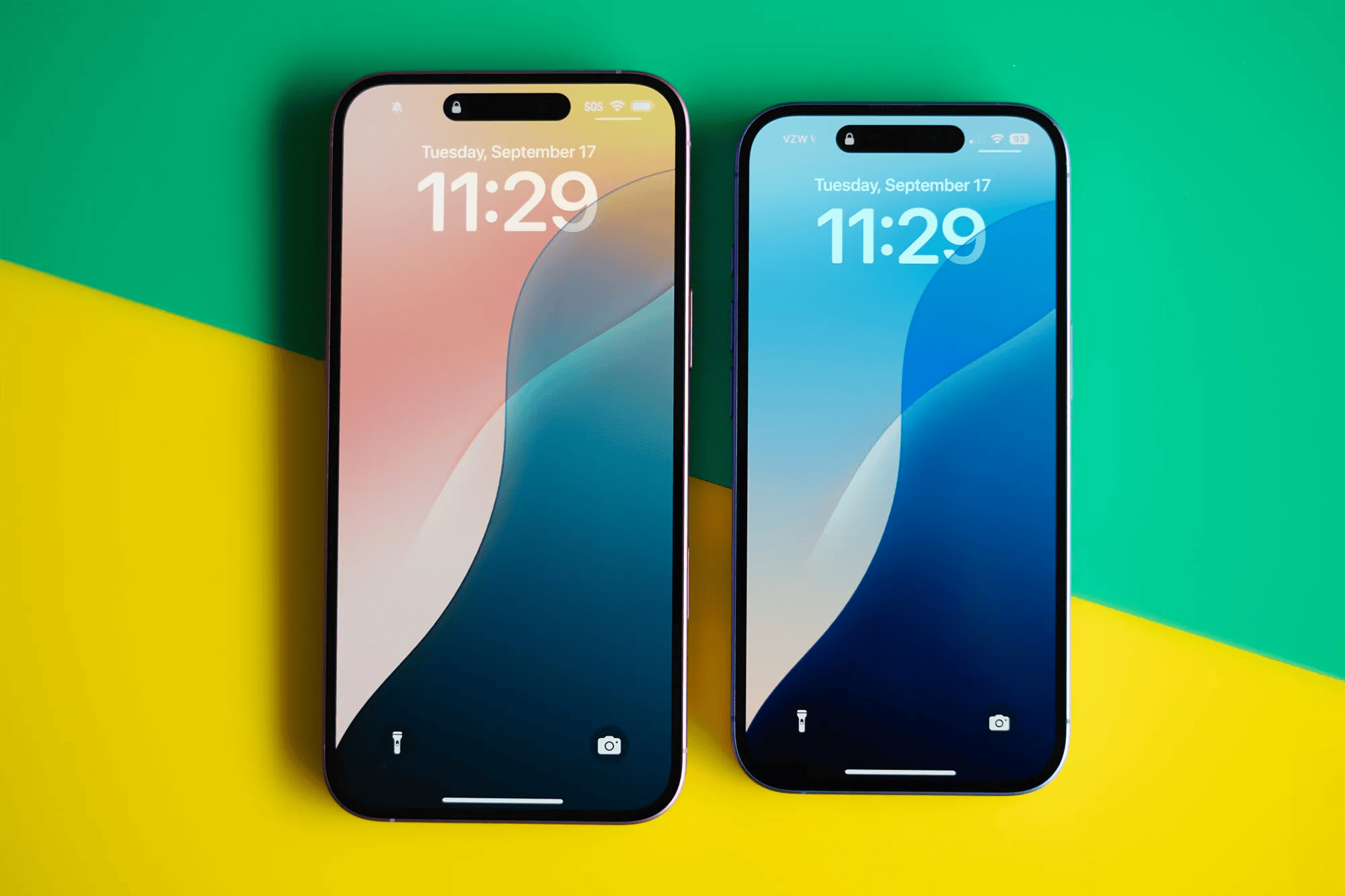
VoIP Call 101 - Do You Know What Is a VoIP Number?
 Updated on
Updated on
 By Rob Marquez
By Rob Marquez
Rob Marquez
Originally from Southern California, Rob moved to Denver over 4 years ago to join the Ringy team as a Mobile Engineer. Rob received his BS and MS in C...
learn more
Rob Marquez
Originally from Southern California, Rob moved to Denver over 4 years ago to join the Ringy team as a Mobile Engineer. Rob received his BS and MS in C...
Table of Contents
Table of Contents
It's that time of the month again, and you already sense what's coming next:
Your dreaded, expensive phone bill.
You have two choices:
One, be stoic like Ned Stark and heroically brace yourself, making minor cuts and adjustments wherever you can.

Two, be cunning like Littlefinger and dump traditional landlines and mobile phones in favor of far more affordable modern technology like VoIP.
The second option sounds better, doesn't it?
But won't it be really hard to implement?
Not if you have a good head on your shoulders — pun intended (GOT spoiler alert) — and a bit of help from a seasoned expert in VoIP technology.
Luckily for you, you have both at hand, so just stick with us for about 20 minutes, and VoIP is sure to become child's play.
Here's what you'll find out:
- The answer to these fundamental questions, "what is a VoIP number?" and "what is a VoIP phone number used for?"
- Why 31% of companies are already using this technology to cut costs and boost customer experiences
- How VoIP can modernize your business via three inspirational case studies
Ready? Awesome, let's get this show on the road.
What is a VoIP Number?

A VoIP number is a virtual phone number that uses the internet (Voice over Internet Protocol) to make and receive phone calls.
Unlike traditional landline numbers, VoIP numbers aren't tied to a physical location. This flexibility offers several benefits, such as:
- Cost-effectiveness: VoIP calls are generally cheaper than traditional phone calls, especially for long-distance or international calls.
- Portability: You can take your VoIP number with you wherever you go, as long as you have an internet connection.
- Advanced Features: VoIP often comes with features like call forwarding, voicemail, and conferencing that might not be available with traditional landlines.
What is a VoIP Number Used For?
A VoIP number has many practical uses. It's commonly employed by businesses for both internal and customer-facing communications because of its cost-effectiveness and flexibility. VoIP numbers allow for:
- Remote Work: Teams can stay connected no matter where they are, making it ideal for businesses with remote employees.
- International Calls: Since the internet powers VoIP, international calls are often much cheaper compared to traditional phone lines.
- Unified Communications: A VoIP number can be integrated into broader communication platforms, including video conferencing, messaging, and file sharing.
For individuals, VoIP numbers can offer privacy, especially when used for online transactions or for side projects where sharing your personal number isn't ideal. So when you ask, "Why would someone use a VoIP number?," the answer often revolves around convenience, cost savings, and security.
Types of VoIP Numbers
VoIP numbers come in two flavors: fixed and non-fixed. Let's break down the differences.
|
Type of VOIP Number |
Key Features |
Ideal For |
|
Fixed VOIP Number |
Tied to a physical location, generally more secure. |
Businesses, local-based services. |
|
Non-Fixed VOIP Number |
Not tied to any physical location, more flexible but less secure. |
International calls, personal use, temporary projects. |
Fixed VoIP Numbers
A fixed VoIP number is tied to a specific physical address, much like a traditional landline. This makes it more reliable and secure, as it can be traced to a particular location. It's particularly beneficial for businesses that need to maintain a local presence or have multiple office locations.
What is a fixed VoIP number used for? Generally, businesses use these numbers to offer local customer service, giving customers the feeling they're speaking to someone nearby, even if the business is operating remotely.
Non-Fixed VoIP Numbers
Non-fixed VoIP numbers, on the other hand, are not tied to any specific address. This makes them incredibly flexible but also less secure, as they are harder to trace. They are often used for personal or temporary purposes, such as freelancers, international callers, or even in some cases, for anonymous communications.
However, because of this anonymity, non-fixed VoIP numbers are sometimes linked to spam or fraudulent activities.
How VoIP Works
At its core, VoIP technology converts your voice into data, sending it over the internet as digital signals. Here's a breakdown of how it works:
- Voice to Digital Signals: When you speak into a VoIP phone, your voice is captured and converted into small packets of digital data.
- Transmission Over the Internet: These digital packets travel over the Internet, similar to how emails or other online data are transmitted. This is the major difference between VoIP and traditional phones, which use dedicated copper lines.
- Conversion Back to Audio: Once the data reaches its destination (the recipient), it is converted back into sound so that the other person can hear you clearly. All of this happens in milliseconds, making VoIP calls just as clear as traditional phone calls.
The entire process is managed by VoIP service providers, who are responsible for routing your calls, maintaining the infrastructure, and ensuring call quality. Good providers can offer HD voice quality, minimize latency, and provide features like call recording, voicemail to email, and more.
VoIP Number vs. Traditional Phone Numbers
When deciding between a VoIP number and a traditional phone number, it's important to understand how they differ. While both serve the same fundamental purpose—allowing you to make and receive calls—their underlying technologies and features vary significantly.
Here's a quick breakdown of the key differences:
|
Aspect |
VoIP Number |
Traditional Phone Numbers |
|
Infrastructure |
Requires internet connection (cloud-based). |
Relies on physical landlines (copper wires or cables). |
|
Location Flexibility |
Can be used anywhere with internet access. |
Tied to a specific geographic location. |
|
Cost |
Generally cheaper, especially for international calls. |
Higher costs for long-distance and international calls. |
|
Features |
Often feature-rich (call forwarding, video, messaging). |
Basic features (call waiting, voicemail, etc.). |
|
Reliability |
Dependent on internet connection and power. |
More reliable, as it operates independently of the internet. |
One of the most significant differences between a VoIP number and a traditional phone number lies in the infrastructure they require.
- VoIP Numbers rely on an internet connection. Calls are transmitted as data packets, meaning you need a stable internet connection for smooth operation. This makes VoIP incredibly flexible because as long as you have access to the internet, you can use your VoIP number anywhere. It's a modern, cloud-based approach that aligns with remote work, international businesses, and people constantly on the move.
- Traditional Phone Numbers, on the other hand, are landline-based. They require a dedicated physical line, such as copper wiring or fiber-optic cables, to make and receive calls. This ties you to a specific location and limits mobility. You can't easily take your landline number with you if you travel or relocate.
Another key difference is the flexibility in how you can use VoIP numbers compared to traditional phone numbers.
- VoIP numbers are location-independent, meaning you can make calls from anywhere in the world without losing your number. Whether you're at home, in an office, or traveling overseas, as long as you have an internet connection, your VoIP number functions seamlessly. This is especially helpful for businesses with remote employees or those operating internationally.
- Traditional phone numbers are tied to a specific geographic region. You can only use them at the location where the physical line is installed, making them less flexible. Plus, if you move, you might have to change your phone number depending on the area code.
Pros and Cons
Advantages of VoIP Numbers:
- Scalability: VoIP systems are easy to scale as your business grows. Need to add another phone line? No need for extra hardware; you can add users or numbers instantly through your VoIP provider.
- Feature-Rich: VoIP numbers come with a host of advanced features, like call forwarding, video conferencing, instant messaging, and integration with CRM systems. It's not just about voice anymore—VoIP numbers are at the center of modern unified communication systems.
- Cost-Effective: With VoIP, you can save significantly on both domestic and international calls, especially compared to traditional phone services. For example, businesses can drastically cut their phone bills by switching to a VoIP provider. In fact, companies using VoIP can save up to 90% on international calls.
Potential Drawbacks of VoIP Numbers
- Dependence on Internet Connectivity: VoIP calls are as good as your internet connection. If you have poor bandwidth or spotty Wi-Fi, your call quality may suffer, leading to delays, dropped calls, or poor audio. This is one reason why some businesses may hesitate to fully embrace VoIP unless they have a reliable internet setup.
- Power Dependency: Traditional phone lines will keep working during a power outage, while VoIP phones rely on electricity to power the internet and devices. If your power or internet goes out, your VoIP line will go down too, which could be a drawback for certain businesses that need uninterrupted phone service.
The Eight Main Benefits of VoIP for Businesses

1. VoIP Is Budget-Friendly
Everybody loves a good deal.
Come on, just think back to the last time you secured a 50% discount on your cable bill.
Didn't it feel great? You bet it did.
And that's why all businesses, no matter their size and financial situation, appreciate the fact that VoIP usually drives an impressive 30-50% savings on telecom costs.
How's that even possible?
- Long-distance and international calls are charged at the local rate.
- Call rates are cheaper because there's no expensive infrastructure to maintain.
- VoIP hardware is cost-effective.
- There's no need to install new lines every time you expand.
- You can slash mobile phone bills by encouraging employees to use VoIP via their smartphone's internet connection.
Take Ringy (our CRM with a built-in cloud VOIP softphone) as an example:
For only $99 a month, you get:
- A VoIP softphone that works from your laptop, tablet, and mobile phone
- 1,000 SMS credits
- 1,000 voice minutes
- Detailed analytics
- And a fully kitted-out CRM
That's pennies in comparison to an average business phone bill.
2. VoIP Is Super Simple
Raise your hand if you hate it when people overcomplicate things.
🖐️🖐️🖐️🖐️🖐️🖐️🖐️🖐️🖐️🖐️🖐️🖐️🖐️🖐️🖐️🖐️🖐️🖐️🖐️🖐️🖐️🖐️🖐️🖐️🖐️🖐️🖐️🖐️🖐️🖐️🖐️🖐️🖐️
We hear you loud and clear, and we're with you.
Nobody wants to learn the meaning of a thousand acronyms just to understand what the heck their telephone installation (or repair) service is talking about.
VoIP makes things as simple as plug-and-play.
Want to scale your operation and add a few new lines? Click a button.
Want to downsize your operation and remove a line or two? Click a button.
Want to access your VoIP number from anywhere in the world? Find an internet connection and then click a few buttons.
Want to transform your analog phone into a VoIP phone? Plug your phone's cable into an Analog Telephone Adapter (ATA) and the ATA into an internet connection socket.
Want to have a conference call? Click a few buttons and dial your colleagues.
Life can be that easy.
3. VoIP Offers Superior Call Quality
VoIP has the advantage of youth over traditional phone lines.
Think about it: VoIP is 25 years old and constantly improving, while the traditional landline is a ripe old 145 and pretty much satisfied with just being alive and kicking.
And this age difference shows when it comes to voice quality.
VoIP has now overtaken traditional phone lines thanks to the proliferation of stable, high bandwidth internet connections and the latest sound compression technology.
You can expect HD call quality and crystal-clear connections when you switch to VoIP.
4. VoIP Allows You To Be Local from Anywhere
Did you know that 82% of consumers patronize local businesses, and 48% plan to shop local even more often in the future?
It's true, and it's a tremendous proxy statistic for demonstrating that people trust local businesses more than those from further afield.
But what does that have to do with VoIP?
VoIP providers allow you to do a bit of magic — you can choose any area code you like for your non fixed VoIP phone numbers.
This feature lets you build up a repertoire of local numbers for all of the most significant locations you do business in, regardless of whether or not you have a physical presence there.
This, in turn, helps you establish local street cred and demonstrate an extra level of commitment to your customers without any of the costs of opening a local branch.
5. VoIP Is Packed with Features
Traditional phones are boring.
They're only good for making and receiving calls.
You can spruce them up a bit by adding a couple of extra features (like call display, call forwarding, and call holding), but that'll cost you quite a bit more.
So, rather than going through the hassle of contacting and negotiating with your telecoms provider, why not trade up and get a more powerful VoIP solution?
The business case adds up, especially if you consider the sheer number of features most VoIP providers offer either straight out of the box or for a tiny added fee.
You can expect functionality like:
- Instant messaging
- Teleconferencing (and video conferencing)
- Voicemail via email (as a voice message or a voice-to-text transcription)
- Faxing via email
- VoIP caller ID
- Smartphone and tablet support
- Call forwarding and call holding
- Toll-free numbers
6. VoIP Is Reliable in a Pinch
Relying on traditional phones leaves you with no backup option when a storm takes out the telephone towers.
Well, aside from going full Lion King:

But most of the time, your arms aren't as long as Rafiki's, and you simply have to wait for the repairs before you can resume your daily routine.
VoIP offers you a plan B.
There's no need to panic if your internet connection goes down.
You just need to set up VoIP call forwarding and get your calls routed to a different device.
If your office internet is down, you can answer your calls via your mobile phone or home broadband connection.
If your mobile signal is gone, you can push the calls back to any device with a functioning broadband connection.
If everything is gone, you can forward your calls to a colleague in a different location.
You're covered in any event short of nuclear warfare or the apocalypse, at which point your VoIP being down would be the least of your worries.
7. VoIP Comes with Powerful Analytics
Call analytics are often overlooked by businesses thinking about switching to VoIP.
It's easy to understand why — most people don't expect their phones to come with powerful insight capabilities because that's what they've been conditioned to expect by traditional analog systems.
But luckily, gone are the days in which only larger enterprises could afford to pull actionable call data by hiring expensive data experts.
And it's all thanks to VoIP and its democratization of call analytics.
Nowadays, any employee can log into the analytics program of their VoIP solution and get immediate access to a wealth of data, including real-time call logs, call recordings, and call tracking metrics like:
- Total calls
- Inbound calls
- Answered calls
- Missed calls
- Talk time
- Calls in queue
- Local/international calls
Just remember to make time for analyzing them, spotting trends, and improving your customer experience (CX) and outbound/inbound performance.
Speaking of CX brings up our last benefit, and arguably the most important one:
8. VoIP Helps You Deliver a Better Customer Experience
We're sure you've heard all about the importance of improving customer experience.
CX is easily one of the biggest business trends of the last decade, and despite industry leaders kicking it around like a hacky sack, it isn't just a buzzword. Don't believe us?
Then take it from one of the world's leading consulting firms, McKinsey & Company, that revealed that improving CX helps you grow revenues by 10-15% and cut costs by 15-20%.
Imagine how good that would look on your next profit and loss statement.
One thing though, how can a simple VoIP system get you closer to these impressive results?
You should already know the answer (hint: it's in the seven benefits above), but since repetition is the mother of learning, we'll give you a quick recap anyway.
- Advanced call analytics enables you to pinpoint customer pain points (i.e., long queue times, overuse of interactive voice response (IVR)) and resolve them.
- VoIP cuts costs and allows you to offer toll-free numbers and cheaper services.
- Local caller ID brings you closer than ever to your customers.
- VoIP technology underpins crystal-clear call quality and reliable service.
- Call recordings help you improve scripts and suggest solutions faster.
How to Get a VoIP Number
Getting a VoIP number is a simple and effective way to modernize your communication. Whether for personal or business use, choosing the right provider and understanding the steps involved will ensure you maximize the benefits of VoIP.
Choosing a VoIP Service Provider
Before you can get a VoIP number, the first critical step is to choose the right VoIP service provider. Providers are different, and your choice will impact everything from call quality to available features.
Here are the key factors to consider:
- Pricing: Different VoIP providers offer a variety of pricing plans. Some may have pay-as-you-go options, while others provide monthly or annual subscriptions. Look for providers with transparent pricing, and avoid those with hidden fees. Also, consider whether their international calling rates align with your needs.
- Features: Depending on your usage, you'll want to evaluate the features each provider offers. Popular features include voicemail-to-email, call forwarding, virtual receptionist, and even video conferencing capabilities. For instance, businesses might prioritize integration with CRM tools, while individuals might look for basic, cost-effective calling plans.
- Customer Support: If something goes wrong, reliable customer support is essential. You need providers who are known for their robust customer service options, ranging from 24/7 support to extensive online knowledge bases.
- Scalability: If you're a growing business, you'll need a provider that can scale with you. Many VoIP services offer easy-to-expand plans, allowing you to add new lines or features as your business grows.
Some popular VoIP service providers include:
- RingCentral: Known for its feature-rich platform, including video conferencing and integrations with business tools.
- Vonage: Offers flexible plans for both personal and business use, with strong customer support.
- Zoom: While famous for video calls, Zoom also provides VoIP services with seamless connectivity for hybrid communication needs.
Steps to Obtain a VoIP Number
Now that you've chosen a provider, here's how you can obtain your VoIP number:
1. Sign-up Process with a VoIP Provider
Most providers have straightforward online registration processes that take only a few minutes. During the sign-up process, you'll typically need to provide basic details such as your name, business information (if applicable), and payment details.
Some providers may even offer free trial periods, giving you a chance to test their services before committing.
2. Number Selection and Activation
Once you've signed up, the next step is selecting your VoIP number. Most providers offer two types of numbers:
- Local Numbers: These correspond to specific geographic areas and are great if you want a presence in a particular region.
- Toll-Free Numbers: Ideal for businesses, toll-free numbers allow customers to contact you without incurring charges.
Once you choose your number, the activation process is usually quick and straightforward. After activation, your number is ready to use for calls, texts, and any additional features your provider offers.
3. Configuring Devices and Setting Up Additional Features
After your VoIP number is active, it's time to configure your devices. One of the perks of using a VoIP service is that you can make and receive calls across multiple devices, including smartphones, tablets, desktop computers, and IP phones. Your provider will guide you through the setup process, typically through an app or web portal.
This is also when you can personalize your VoIP experience by setting up features like call forwarding, voicemail, auto-attendants, and more. If you've chosen a provider like RingCentral, you'll have access to a wide range of configuration options that enhance communication efficiency.
Security Considerations for VoIP Numbers
While VoIP offers many benefits, it's essential to be aware of the potential security risks. Just like any other technology, VoIP can be vulnerable to attacks if proper precautions aren't taken.
Potential Security Risks
VoIP numbers, much like any other internet-based service, can be vulnerable to a range of security threats. Here are a few of the most common:
- Hacking: Since VoIP relies on internet connections, it's susceptible to hacking. Malicious actors can gain unauthorized access to your VoIP number and use it for fraudulent activities, or even intercept and manipulate calls.
- Eavesdropping: Without proper security measures, it's possible for hackers to intercept your VoIP calls and listen in, leading to privacy breaches. This can be particularly concerning for businesses handling sensitive information.
- Phishing: VoIP users are also vulnerable to phishing attacks, where cybercriminals disguise themselves as legitimate organizations to trick you into providing sensitive information. This can happen through fraudulent calls or fake VoIP account login pages.
Given these risks, protecting your VoIP number and communications is critical, whether for personal use or business.
Best Practices for VoIP Security
To secure your VoIP number, follow these best practices and minimize potential vulnerabilities:
- Implement Strong Passwords: One of the simplest yet most effective steps is to use strong, unique passwords for your VoIP accounts. Avoid predictable combinations like "123456" or "password." Instead, use a complex mix of letters, numbers, and special characters to make it harder for hackers to break in.
- Use Encryption: Encryption scrambles your data so that even if someone intercepts it, they can't understand the information. Make sure your VoIP provider supports end-to-end encryption, especially for sensitive conversations. Encrypted VoIP calls offer peace of mind, particularly when discussing confidential business matters.
- Update Software Regularly: Cybercriminals often exploit outdated software, taking advantage of vulnerabilities that haven't been patched. Regularly updating your VoIP software ensures you're using the latest security features and protections. Most VoIP providers will release updates periodically, so don't ignore those notifications!
- Choose a Reputable VoIP Provider: Not all VoIP providers are created equal. Look for a provider with a solid reputation for security. Well-known companies often provide features like encrypted calls, two-factor authentication, and regular security audits. Additionally, ensure they have 24/7 support to address any issues promptly.
By following these security measures, you can significantly reduce the risks associated with VoIP and protect both your communications and data from unwanted intrusions.
Industries Where a VoIP Number is Commonly Used
VoIP is sounding pretty sweet at this point, or are we wrong?
We don't think so. 😊
But is this cost-saving and performance-improving technology for everyone?
The short answer is yes: VoIP can help any type of organization.
The longer answer is: it helps a certain set of industries even more, making it an absolute must-have if you're working in one of the sectors mentioned in the table below.
|
Industry |
Why VoIP makes a difference |
|
Sales and recruiting |
|
|
Customer service |
|
|
Financial services |
|
|
Insurance |
|
|
e-Commerce |
|
|
Small businesses and startups |
|
|
Law firms, real estate, and other agencies |
|
Need a couple of VoIP case studies to seal the deal?
Here you go:
Conclusion: You Need To Get Started With VoIP ASAP
By now, the hardest thing left about VoIP technology should be pronouncing the name of that village and county in Wales.
It's "gil·vak gok" and "ron·thuh kuh·nuhn taf."
But don't worry if transliteration doesn't help; rather focus on the fact that you're ready to find a VoIP provider and equip your business with VoIP.
You know which type of VoIP you need (fixed vs. non fixed), and you're clear on the eight benefits that you should use to populate your business case:
- Lower costs
- Simple to implement and use
- Phenomenal call quality
- Local numbers from anywhere
- Feature-rich
- Reliable
- Actionable insights
- Better customer experience
So get out there and find your company a solution.
We'd love it if your first stop was a two-week free trial of our very own Ringy — it's a powerful sales CRM that has a cloud VoIP softphone built-in, so you can get the best of both worlds without having to play around with integrations and multiple bills.
But no hard feelings as long as you find a rocking VoIP system!

Skyrocket your sales with the CRM that does it all.
Calling? Check. SMS? Check. Automation and AI? Check. Effortlessly keep in touch with your customers and boost your revenue without limits.

Take your sales to new heights with Ringy.
Sales in a slump? Ringy gives you the tools and flexibility you need to capture leads, engage with them, and turn them into customers.
Subscribe to Our Blog
Enter your email to get the latest updates sent straight to your inbox!
Categories
Related Articles














.jpg)




.jpg)


.jpg)
















































